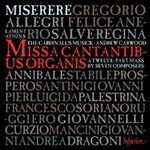
Miserere & the music of Rome
 $45.00
Special Order
$45.00
Special Order3 - 6 weeks add to cart
ALLEGRI / PALESTRINA / ANERIO
Miserere & the music of Rome
The Cardinall's Musick, Andrew Carwood (conductor)
[ Hyperion / CD ]
Release Date: Sunday 20 February 2011
This item is only available to us via Special Order. We should be able to get it to you in 3 - 6 weeks from when you order it.
"This recording's breadth of moods, devices and styles is refreshing...More importantly, the vocalists use declamation to emote, transporting the listener from sorrow to transcendent joy."
(BBC Music Magazine - Choral & Song Choice - March 2011)
"Carwood and his Cardinall's Musick [give] the piece perhaps its finest recorded performance. Using female sopranos as he does is of course itself inauthentic, but Carwood is vindicated by their bell-like clarity and thrilling projection...The triumphant success of this disc is much enhanced by the vividness of the recording."
(Five Stars Mail on Sunday)
"The drama and flamboyant colours of Baroque Rome's art and architecture and wonderfully present in this reconstruction of its sacred music. This recording's breadth of moods, devices and styles is refreshing...More importantly, the vocalists use declamation to emote, transporting the listener from sorrow to transcendent joy."
(BBC Music Magazine - Choral & Song Choice - March 2011)
"What this disc shows...is that they all deserved a better fate than being buried in a list of Palestrina's younger colleagues. It also shows that a burning commitment can lift music off the page and give it real life...this is all really exciting stuff and should be heard by anybody who cares about music of the late-16th century."
(Gramophone)
The Cardinall's Musick finished 2010 in a blaze of glory with their Gramophone Recording of the Year award for the last volume of their Byrd Edition. Only the second time in thirty years that an Early Music recording has received this prestigious accolade, it is a fitting tribute to the soaring artistry of the group and their director, Andrew Carwood.
Their eagerly-awaited next disc features music from late sixteenth-century Rome and ranges from Allegri's Miserere, surely the best-known and best-loved work of this period, to a rarely-performed or recorded oddity. Seven Roman musicians came together (or were brought together) to write a Mass-setting where they each contributed different sections. The resulting work, the twelve-voice Missa Cantantibus organis, is a tribute both to Cecilia (the patron saint of music) and to Palestrina. The seven composers each take themes found in Palestrina's motet of the same name and use them as the starting point for their new compositions. Palestrina himself is among the seven, with Giovanni Andrea Dragoni, Ruggiero Giovannelli, Curzio Mancini, Prospero Santini, Francesco Soriano and Annibale Stabile being the other six. All seven composers were prominent maestri in Rome and most appear to have had contact with Palestrina either as choristers or pupils.
Tracks:
Allegri:
De lamentatione Jeremiae prophetae
Miserere mei, Deus
Incipit lamentatio Jeremiae prophetae
Gustate et Videte
Anerio, F:
Salve regina
Palestrina:
Cantantibus organis
Missa Cantantibus organis
A Twelve-Part Mass by seven composers: Giovanni Andrea Dragoni, Ruggiero Giovannelli, Curzio Mancini, Giovanni Palestrina, Prospero Santini, Francesco Soriano and Annibale Stabile

